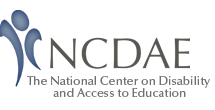NCDAE Accessibility Newsletter - July 2009
In this Edition:
- Featured Article: Project GOALS Materials Preview – Tell Us What You Think
- What's New at NCDAE
- Upcoming Events: WebAIM Web Accessibility Training
- Call for Participation
- Factoid
- Affiliate Highlight: Myk Garn
- In the News
Featured Article: Project GOALS Materials Preview – Tell Us What You Think
Project GOALS (Gaining Online Accessible Learning through Self-study) is developing a set of materials to assist institutions of higher education in the development and promotion of enterprise-wide web accessibility for persons with disabilities.
These materials include an action paper created to help university administrators understand the importance of web accessibility, and promote it across their institution. Also developed is a set of institutional indicators and benchmarks that provide a framework for enterprise-wide web accessibility.
These materials are ready for review. We are seeking comment on the Administrator Action Paper and the Institutional Indicators. Participants will receive a final copy and be acknowledged for their contribution. We welcome any thoughts or comments you may have. We also have a brief 8 item survey to gauge the relevance of each document. If you are interested in volunteering to review these documents, please contact Heather Mariger (heatherm@cpd2.usu.edu) or Cyndi Rowland (Cyndi@cpd2.usu.edu)
You may view draft versions of the materials here:
To review the Action Paper: http://ncdae.org/goals/actionpaper.php
To review the Institutional Indicators: http://ncdae.org/goals/indicators.php
What's New at NCDAE
The Steppingstones of Technology Project at NCDAE recently expanded the WAVE accessibility evaluation tool to include additional rules to help web developers evaluate the accessiblity of their pages for users with cognitive disabilities. You can check out the tool at http://wave.webaim.org.
Project developers are currently working on an Adobe Dreamweaver extension so that WAVE can work alongside this important authoring tool.
Upcoming Events: WebAIM Web Accessibility Training
Join WebAIM (a partner) for two days of intensive, hands-on web accessibility training September 30-October 1. For more information, visit http://webaim.org/training/
Call for Participation
Project GOALS (Gaining Online Accessible Learning through Self-study) is seeking institutions to field -test a self-study process on web accessibility this fall, using a web-based audit tool under development. The self-assessment tool is intended for strategic planning and continuous improvement of enterprise-wide web accessibility. Institutions that participate in the field-test will receive acknowledgment of their efforts in the final version as well as complementary access to the tool. Interested parties should contact Heather Mariger (heatherm@cpd2.usu.edu) or Cyndi Rowland (Cyndi@cpd2.usu.edu)
Factoid
A December 2008 National Center for Education Statistics (NCES) study reported that there were an estimated 12.2 million enrollments in college-level credit-granting distance education courses during the 2006–07 academic year. This includes:
- 77% online courses
- 12% hybrid/blended online courses
- 10% other types of distance education courses
Online courses are integral to modern education. Therefore, it is essential that these courses can be accessed by everyone, include students with disabilities.
To read the full report, visit: http://nces.ed.gov/pubs2009/2009044.pdf
Affiliate Highlight: Myk Garn
 Myk Garn is the Director of Educational Technology for the Southern Regional Education Board (SREB). The SREB was founded in 1948 as a nonprofit, nonpartisan organization that works with leaders and policymakers in 16 member states to improve pre-K through postsecondary education. Myk directs the SREB Educational Technology Cooperative which provides information and analysis on the potential impact of educational technology to guide schools, colleges, state education agencies, and legislative policy makers as they create and expand effective uses of technology.
Myk Garn is the Director of Educational Technology for the Southern Regional Education Board (SREB). The SREB was founded in 1948 as a nonprofit, nonpartisan organization that works with leaders and policymakers in 16 member states to improve pre-K through postsecondary education. Myk directs the SREB Educational Technology Cooperative which provides information and analysis on the potential impact of educational technology to guide schools, colleges, state education agencies, and legislative policy makers as they create and expand effective uses of technology.
Prior to joining SREB in May 2008, Dr. Garn was Associate Vice President for eLearning at the Kentucky Council for Postsecondary Education (CPE) where he served as Executive Director of the Kentucky Virtual Campus managing the strategic initiatives and day-to-day operations of the Virtual Campus and leading statewide distance education policy and technology efforts. During his nine-year tenure in Kentucky Myk also served as the founding Chief Academic Officer for the Kentucky Virtual University and as Senior Advisor for Academic Affairs for the Academic Affairs unit of CPE. Prior to Kentucky he served as Director of Distance Education for the University System of Georgia, Executive Director of the Instructional Technology Development Center at Lamar University in Texas, as producer of the award winning "Techniques of the Masters" satellite television series for Eastman Kodak Company, as manger of the Ocean Photo Centre in Grand Cayman, B.W.I., as a photography instructor at Lansing Community College and as a commercial photographer in Lansing, Michigan.
Dr. Garn received holds a B.A. in Photography from Brooks Institute, an M.A. in Educational System Design from Michigan State University, and a Ph.D. in Educational Policy Evaluation from the University of Kentucky.
Myk is a member of the NCDAE community and served as an avid proponent for accessibility while with CPE. He continues his accessibility work at SREB. He leads SREB's partnership with Project GOALS (Gaining Online Accessible Learning through Self-study), providing invaluable insight and support in the creation and development of materials to help institutions with enterprise-wide web accessibility efforts.
In the News:
The Kindle Controversy
Amazon's Kindle had generated a lot of buzz over the past few years. This innovation is an electronic paper display that uses wireless technology to allow users to purchase and read over 275,000 book titles on a display that is lighter and easier to carry than a typical paperback book. The buzz turned ugly when Amazon announced that their new version (Kindle 2) would include a text to speech function. This caused the Author's Guild to object – complaining that this infringed on copyright laws and would damage sales of audio books. Amazon then agreed to give the publisher's the option to disable this functionality.
However, advocates for the blind and reading disabled protested – vocally! They argued that removing this function was discriminatory and interfered with their rights to equal access. Furthermore, they argued, text to speech is not a threat to audio books – audio books are performances while the synthetic voice used by text readers, while much improved over early versions, is not the same as a professionally read book.
The Authors Guild then suggested that those with print disabilities take advantage of an exception to the copyright act that allows them, with special certification, to activate their Kindles to override the voice restrictions placed on the book by the publisher. However, the National Federation of the Blind (NFB) argued that this places undue burden on the users who must prove they qualify or pay extra for the functionality.
Even with the text to speech functionality Kindle 2 was not fully accessible, with limited font sizes and lacking voice prompts for the menus. However, Amazon is working on making the Kindle usable for sightless navigation and the Reading Rights Coalition is circulating an online petition to stop the removal of the text to speech option.
This issue is critical as the outcome will likely inform copyright and accessibility issues for years to come:
- Petition: Allow Everyone Access to E-books
http://www.thepetitionsite.com/1/We-Want-To-Read - Author Rights vs. Disability Rights
http://www.webteacher.ws/2009/04/14/author-rights-vs-disability-rights/ - Wanted: Your Stories of Disability Versus Copyright Law
http://www.eff.org/deeplinks/2009/04/wanted-your-stories-disability - Making the Kindle Accessible to the Print Disabled
http://www.authorsguild.org/advocacy/articles/kindle-accessibility.html - Author's Guild Responds to Protests
http://reidmymind.com/?p=151 - Group protests Kindle e-reader's read-aloud limits
http://www.usatoday.com/tech/products/2009-04-08-kindle-protest_N.htm - Row Brewing Over E-Book Speech Function Removal
http://www.headstar.com/eablive/?p=244 - Advocates for blind protest loss of Kindle's voice function
http://news.cnet.com/8301-1023_3-10214427-93.html - Reading Rights Coalition Urges Authors to Allow Everyone Access to E-books Informational Protest to be Held at Authors Guild Headquarters
http://yubanet.com/life/Reading-Rights-Coalition-Urges-Authors-to-Allow-Everyone-Access-to-E-books.php - Kindle 2 fails accessibility test
http://wheeliecatholic.blogspot.com/2009/02/kindle-2-fails-accessibility-test.html - Make the Kindle 2 Fully Accessible
http://www.petitiononline.com/Kindle2/petition.html - Amazon Kindle for people with disabilities
http://www.it-director.com/blogs/Abrahams_Accessibility/2007/12/Amazon_Kindle_for_people_with_disabilities.html
WIPO Treaty to Ensure Accessibility for Persons with Visual Impairments
In a related wrinkle, several Latin American and Caribbean countries have petitioned WIPO (World Intellectual Property Organization) to negotiate a treaty that will allow international copyright exceptions for persons with visual impairments. Treaty proponents argue that people with visual impairments in developing countries have highly limited access to printed materials due to the costs related to copyright issues across borders.
However, some representatives from industry and developed countries argue that the proposed treaty is "premature" recommending instead that a solution be sought through discussions between stakeholders (would-be readers and publishers).
The WIPO Standing Committee on Copyright and Related Rights (SCCR) which met May 25-29, 2009 ultimately decided that this was an ongoing issue which needed more study:
"1 The Committee reconfirmed its commitment to work on the outstanding issues of the limitations and exceptions, as decided at the seventeenth session of the SCCR, taking into account development-related concerns and the need to establish timely and practical result-oriented solutions. Likewise, the Committee reaffirmed its commitment to continue without delay its work in a global and inclusive approach, including the multifaceted issues affecting access of the blind, visually impaired and other reading-disabled persons to protected works.
"2 The Committee expressed its appreciation for the Proposal by Brazil, Ecuador and Paraguay Relating to Limitations and Exceptions: Treaty Proposed by the World Blind Union (WBU). Views were expressed: supporting the proposal for a binding instrument; expressing the wish for more time to analyze it; expressing the desire to continue the work on the basis of a global and inclusive framework; and expressing that deliberations regarding any instrument would be premature. Member States will continue to consult on these issues at national level and report on the activities and views on possible solutions. This proposal, together with other possible proposals and contributions by the Members of the Committee, will be discussed at the nineteenth session of the SCCR...."
Source: http://www.wipo.int/edocs/mdocs/copyright/en/sccr_18/sccr_18_conclusions.pdf
- WIPO: Copyright Committee moves forward with exceptions and limitations
http://www.twnside.org.sg/title2/intellectual_property/info.service/2009/twn.ipr.info.090604.htm - Group Of Countries To Back Proposal For WIPO Treaty On Blind Readers' Rights
http://www.ip-watch.org/weblog/2009/05/25/group-of-countries-to-back-proposal-for-wipo-treaty-on-blind-readers%E2%80%99-rights/ - Proposed WIPO Treaty On Visually Impaired Access Gets Deeper Look
http://www.ip-watch.org/weblog/2009/05/29/proposed-wipo-treaty-on-visually-impaired-access-gets-deeper-look/ - Call For Work On Exceptions And Limitations In Wipo Copyright Committee
http://ictsd.net/i/ip/39603/

